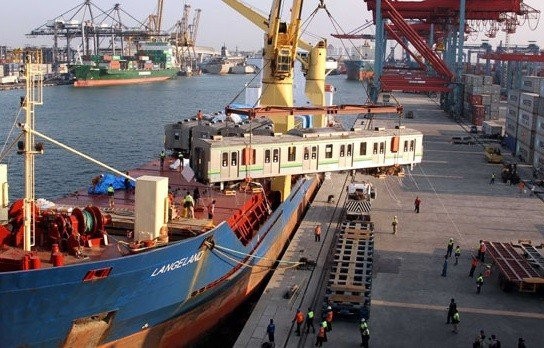Popular Reads
Top Results
Can't find what you're looking for?
View all search resultsPopular Reads
Top Results
Can't find what you're looking for?
View all search resultsSix banks join digital port billing system
Change text size
Gift Premium Articles
to Anyone
S
ix banks have agreed to partner with four of Indonesia’s largest port operators under the PT Pelindo umbrella to build an integrated billing system (IBS), which aims to improve financial transactions at the country’s major ports.
The four state-owned port operators — Pelindo I, II, III and IV — are partnering with Bank Mandiri, Bank Negara Indonesia (BNI), Bank Rakyat Indonesia (BRI), Bank Central Asia (BCA), Bank Bukopin and Bank CIMB Niaga to create a cash management system for billing purposes.
IBS, as part of the Inaportnet development, is an initiative from the Transportation Ministry that aims to accelerate the shipping administration process between the port authority and port operators.
Through this system, all transactions made at ports will be dependent mainly on cashless payments and will provide more efficiency for customers, said Pelindo IV’s financial director Budi Revianto.
“The system will be implemented in all of Pelindo’s associated ports as a way to ease financial transactions. At the moment, six banks are enough because we are trying to encapsulate all major markets in this country. There will be more banks involved if necessary,” he said on Tuesday.
The port integrated billing system will handle features related to eregistration, e-booking, e-tracking, e-tracing, e-payments, e-billing and e-care.
The system has been tested at major ports such as Jakarta’s Tanjung Priok Port and has reportedly been implemented in three other ports including Belawan Port in Medan, North Sumatra, Tanjung Perak Port in Surabaya, East Java, and Makassar Port in South Sulawesi.
Additionally, Budi said e-payment systems at Pelindo ports had actually been implemented, along with proper education programs for the port crew members during the transition period.
Initiated by the State-Owned Enterprises Ministry, the integrated banking system is projected to solve the long dwell times in Indonesian ports.
Syafrudin M. Adam, BNI’s vice president for client services and the transactional banking division, expects to see a smooth and simple transition process, as internet banking users are already large enough among the customer base.
State-owned port operators have begun to develop Informations and Communications Technology (ICT) systems to improve operations this year. Pelindo III announced in May that it was developing a full ICT system that will connect 14 ports in seven provinces in real time. The investment is projected to reach Rp 1 trillion (US$74 million).
The seven ports include Tanjung Perak, Tanjung Mas in Semarang, Central Java, Lembar port in West Lombok, West Nusa Tenggara and Benoa ports in Bali.
Pelindo I, II and IV have recently announced that they will follow the steps taken by Pelindo III, allowing 24 ports from Sumatra to Papua to be connected under a single system, forming the backbone of the government’s sea toll program. The ICT system is predicted to finish the development phase within the next two years.
With the Port ICT systems currently being developed and the IBS moving into place, the government is one step closer toward perfecting its National Single Window (INSW) program. The program aims to manage the country’s flow of goods through an integrated electronic system.
This would result in more efficient shipping mechanisms, a significant reduction in goods clearance times and lower business costs. Currently, the lack of coordination among ministries and institutions acts as an obstacle to the integrated system. Various ministries and institutions run their own systems to organize export and import licenses, creating red tape for businesspeople.
The Inaportnet system is part of port operators’ efforts to better monitor domestic commodities and anticipate complaints relating to dwell-time, which is one of Indonesia’s largest trading weaknesses.
The Inaportnet system was initially designed to be applied to several ports only, but Pelindo decided to apply it to all ports to provide better connectivity and reduce dwell times.










